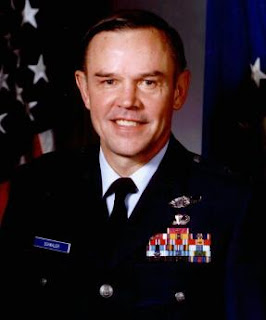
Air Force Brigadier General Terry Schwalier was the on-site Air Force wing commander during the Khobar Towers terrorist bombing in 1996. A flawed investigation held him partly responsible for the attack, and ruined his career. Almost 12 years later, a corrections board has ruled that it was unfair to blame him for the attack by denying him a second star (USAF photo via Air Force Times)
Subsequent investigations–there would, ultimately, be a total of four–focused (rightly) on force protection issues, and whether more could have been done to protect personnel living at Khobar Towers. The best-known inquiry was the first, led by retired Army General Wayne Downing, whose last active-duty assignment was as commander of U.S. Special Forces Command.
Downing, who died last year at age 68, enjoyed a legendary reputation as a special forces operator and leader, with little tolerance for internecine bickering or political correctness. Yet, the Downing inquiry quickly became a political football. Under pressure from Congressional Republicans, Defense Secretary William Perry ordered the general to complete his probe in 60 days–a deadline that did not provide enough time to fully investigate the blast, or determine potential culpability within the chain of command.
And, as the Weekly Standard’s Matt Labash later discovered, Downing–and his bosses in the Pentagon–did nothing to insulate the probe from partisan politics. Mr. Perry relayed Congressional “concerns” to General Downing, and the focus of his probe began changing in early July, less than a month after the bombing.
As early as July 10, a days after the first Khobar hearings, Perry instructed Downing that, “as a result of high Congressional interest, we must expedite portions of your assessment process. Downing should include in his report, Perry said, “what U.S. official(s) were responsible for actions to improve or upgrade the [perimeter] fence.
The Defense Secretary also told South Carolina Senator Strom Thurmond that Downing was empowered to explore accountability, and that the retired General “fully understands what is expected of this assessment.”
In its rushed assessment, the Downing Commission placed most of the blame for the Khobar debacle on Brigadier General Terry Schwalier, the Air Force wing commander on the scene. That determination stunned senior officers; sources told Labash that both the CENTCOM Commander (General A.B. Peay) and the Air Force Chief of Staff, General Ron Fogelman, had been assured that no one would be found culpable, including Schwalier. General Downing disputed that claim, although General Peay confirmed that he had received such assurances.
While three subsequent inquiries would exonerate him, Schwalier’s career was ruined by the Downing investigation. He was denied a second star and retired from active duty in 1997, stung by the harsh judgment of the flawed report, which contained at least 37 incorrect statements, 61 misleading implications and 23 contradictions. General Fogelman became an indirect casualty of the probe; angered by its politics (and its conclusions), the Chief of Staff retired early in protest.
Over the decade that followed, General Schwalier fought a long battle to clear his name. His efforts were largely unsuccessful until he came across an Air Force Academy classmate, Michael Rose, at a conference in 2005. Schwalier told Rose, an attorney practicing in South Carolina, that he had just received another rejection from the Air Force Board for the Correction of Military Records, denying a request for reinstatement of his promotion to Major General. Three months before the bombing, Schwalier had been confirmed for his second star by the Senate, but then-Secretary of Defense William Cohen removed his name from the promotion list after release of the Downing report.
Rose agreed to represent Schwalier for free and submitted a new request for correction last September. While preparing that appeal, Rose made some rather startling discoveries. In 2004, he learned, the corrections board ruled that Schwalier, had (in fact) been promoted to Major General on 1 January 1997, although he never pinned on that rank. However, the same official who approved the correction later reversed his decision. According to Mr. Rose, that marked the first time that a civilian Air Force attorney had interfered with a board decision, an action he described as a clear abuse of authority.

